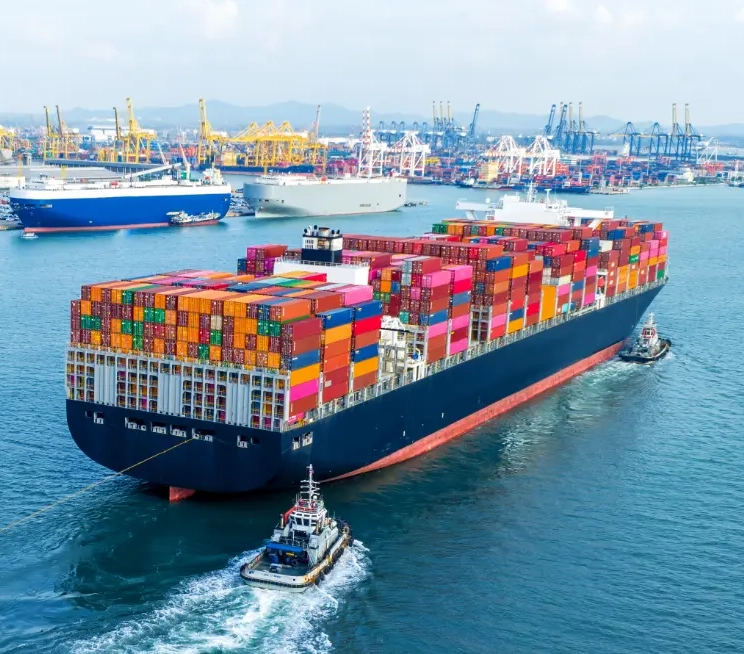The logistics and shipping industry is the backbone of global trade, ensuring that goods are transported from one part of the world to another efficiently and cost-effectively. In recent years, the introduction of Artificial Intelligence (AI) has revolutionized this industry, bringing in unprecedented levels of efficiency, accuracy, and innovation. This blog explores how AI is transforming and optimizing logistics and shipping, making it smarter, faster, and more reliable.

How is AI Transforming and Optimizing Logistics and Shipping?
1. Enhancing Supply Chain Management:
One of the most significant impacts of AI in logistics is its ability to improve supply chain management. AI algorithms analyze vast amounts of data in real-time, helping companies predict demand, optimize inventory levels, and ensure that products are available when and where needed. This leads to better coordination between suppliers, manufacturers, and distributors, minimizing delays and reducing costs.
For example, AI-powered tools can forecast demand by analyzing historical sales data, market trends, and even external factors like weather conditions. This allows businesses to adjust their production and shipping schedules accordingly, reducing the risk of overproduction or stockouts.
2. Streamlining Operations with Automation:
Automation is another area where AI is making a significant impact. In warehouses and distribution centers, AI-powered robots and machines are taking over repetitive and time-consuming tasks such as sorting, packing, and labeling. These automated systems not only work faster than humans but also with greater precision, reducing the chances of errors and improving overall efficiency.
Moreover, AI-driven automation extends to transportation as well. Developers and testers are advancing autonomous vehicles and drones to deliver goods more efficiently, especially to hard-to-reach areas. These technologies are expected to reduce delivery times, lower transportation costs, and minimize human error.
3. Optimizing Routes and Reducing Costs:
AI is also transforming the way logistics companies plan and optimize their delivery routes. Traditional route planning methods often rely on static data and can be inefficient, leading to longer delivery times and higher fuel consumption. AI, on the other hand, uses real-time data and machine learning algorithms to calculate the most efficient routes for deliveries.
By considering factors such as traffic conditions, weather patterns, and road closures, AI can suggest the quickest and most cost-effective routes. This not only saves time and fuel but also reduces the carbon footprint of the transportation industry, contributing to environmental sustainability.
4. Improving Customer Experience:
In today’s competitive market, customer satisfaction is crucial, and AI is helping logistics companies enhance their customer service. AI-powered chatbots and virtual assistants are increasingly being used to handle customer inquiries, track shipments, and provide real-time updates on delivery status. These tools offer instant responses and can handle multiple queries simultaneously, improving the overall customer experience.
Additionally, AI can analyze customer feedback and behavior patterns to identify areas where service can be improved. This allows logistics companies to tailor their offerings to meet customer needs better, leading to increased customer loyalty and retention.
5. Enhancing Security and Risk Management:
Security is a major concern in the logistics and shipping industry, with goods often traveling through multiple hands and locations before reaching their final destination. AI is playing a crucial role in enhancing security by monitoring and analyzing data to detect potential threats and anomalies.
For instance, AI-powered surveillance systems identify suspicious activities in real time, allowing for immediate action.Similarly, AI algorithms can assess risks associated with different routes or shipping methods, helping companies make informed decisions to minimize losses.
6. Predictive Maintenance:
Finally, AI is being used to predict and prevent equipment failures in the logistics industry. By analyzing data from sensors and monitoring systems, AI can detect signs of wear and tear in vehicles, machinery, and other equipment. This allows companies to perform maintenance before a breakdown occurs, reducing downtime and ensuring that operations run smoothly.
Predictive maintenance not only improves the reliability of equipment but also extends its lifespan, leading to cost savings in the long run.
The Bottom Line:
AI is undoubtedly transforming and optimizing the logistics and shipping industry in numerous ways. From enhancing supply chain management and streamlining operations to improving customer experience and enhancing security, AI is making the industry smarter, more efficient, and more resilient.
As AI technology evolves, it will drive even greater innovations that will further revolutionize global goods transportation. Embracing AI is no longer just an option; it is a necessity for logistics companies that want to stay competitive and meet the demands of the modern world.
At Eleevate Logistics, we leverage the power of AI to optimize your shipping processes, reduce costs, and ensure timely deliveries. Contact us today to learn how we can help your business thrive in the AI-driven logistics landscape!


